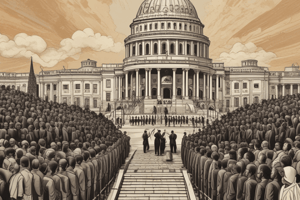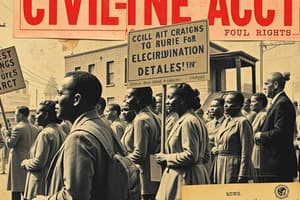Podcast
Questions and Answers
Which of the following is NOT covered by the Civil Rights Act of 1964, but may be covered under other statutes?
Which of the following is NOT covered by the Civil Rights Act of 1964, but may be covered under other statutes?
- Race
- Sex
- Age (correct)
- Religion
What is the most important federal statute prohibiting employment discrimination against members of a protected class?
What is the most important federal statute prohibiting employment discrimination against members of a protected class?
Title VII of the Civil Rights Act of 1964.
What is the federal agency that monitors compliance with Title VII?
What is the federal agency that monitors compliance with Title VII?
Equal Employment Opportunity Commission.
Title VII applies to employers with ______ or more employees.
Title VII applies to employers with ______ or more employees.
In 2011, the United States Supreme Court limited the rights of employees to bring discrimination claims against their employers as a group in the form of a class action lawsuit.
In 2011, the United States Supreme Court limited the rights of employees to bring discrimination claims against their employers as a group in the form of a class action lawsuit.
What is one way for a plaintiff to prove a disparate impact?
What is one way for a plaintiff to prove a disparate impact?
What term is used when labor practices discriminate against those in the majority?
What term is used when labor practices discriminate against those in the majority?
In addition to the Civil Rights Act of 1964, victims of racial or ethnic discrimination may also have a cause of action under what statute?
In addition to the Civil Rights Act of 1964, victims of racial or ethnic discrimination may also have a cause of action under what statute?
Employers cannot treat their employees more or less favorably based on their _______ beliefs or practices.
Employers cannot treat their employees more or less favorably based on their _______ beliefs or practices.
Title VII of the Civil Rights Act prohibits government employers, private employers, and unions from discriminating against persons because of their religion.
Title VII of the Civil Rights Act prohibits government employers, private employers, and unions from discriminating against persons because of their religion.
The Equal Pay Act requires equal pay for male and female employees working at the same establishment doing similar work.
The Equal Pay Act requires equal pay for male and female employees working at the same establishment doing similar work.
The Lily Ledbetter Act states that an employee who claims she has received discriminatory wages has a limited time period with which to file a complaint in federal court.
The Lily Ledbetter Act states that an employee who claims she has received discriminatory wages has a limited time period with which to file a complaint in federal court.
Constructive discharge occurs when the employer causes the employee's working conditions to be so intolerable that a reasonable person in the employee's position would feel compelled to quit.
Constructive discharge occurs when the employer causes the employee's working conditions to be so intolerable that a reasonable person in the employee's position would feel compelled to quit.
What must occur for an employer to be held liable for a supervisor's sexual harassment?
What must occur for an employer to be held liable for a supervisor's sexual harassment?
In a retaliation claim, an individual asserts that he or she has suffered harm as a result of making a Title VII complaint.
In a retaliation claim, an individual asserts that he or she has suffered harm as a result of making a Title VII complaint.
When sexual harassment is between co-workers, the employer is generally liable only if the employer _____ or ________known about the harassment.
When sexual harassment is between co-workers, the employer is generally liable only if the employer _____ or ________known about the harassment.
Punitive damages are always awarded to successful plaintiffs in sexual harassment claims.
Punitive damages are always awarded to successful plaintiffs in sexual harassment claims.
Study Notes
Title VII of the Civil Rights Act of 1964 Overview
- Title VII prohibits employment discrimination based on race, color, national origin, religion, gender, age, and disability.
- Applies to employers with 15 or more employees.
- Managed by the Equal Employment Opportunity Commission (EEOC).
Discrimination Definitions
- Disparate-impact discrimination: When practices adversely affect a protected group, regardless of intent.
- Disparate-treatment discrimination: Intentional discrimination against a member of a protected class.
- Employment discrimination: Unequal treatment of employees or applicants based on protected characteristics.
Legal Framework
- 42 U.S.C. Section 1981 addresses causes of action for racial or ethnic discrimination.
- The Equal Pay Act mandates equal pay for similar work between male and female employees.
Court Cases and Impacts
- The 2011 Supreme Court decision limited class action discrimination claims.
- Constructive discharge occurs when intolerable conditions force an employee to resign.
Harassment Types
- Quid pro quo harassment: Demands for sexual favors in exchange for job benefits.
- Hostile-environment harassment: Offensive conduct pervading the workplace without employer intervention.
Employer Liability and Claims
- Employer liability in harassment cases typically requires evidence of tangible employment action against the victim.
- Ellerth/Faragher defense can reduce employer liability if reasonable preventive measures were taken and the employee unreasonably failed to utilize them.
- Retaliation claims arise from harm suffered after making Title VII complaints or participating in investigations.
Unique Aspects of Claims
- Employers can be found liable for harassment between co-workers if they knew or should have known about it and did not act.
- Punitive damages are not always awarded in sexual harassment claims; they require evidence of employer negligence.
Studying That Suits You
Use AI to generate personalized quizzes and flashcards to suit your learning preferences.
Description
Test your knowledge of Title VII of the Civil Rights Act of 1964 with this set of flashcards. Explore key terms and concepts related to employment discrimination and relevant statutes. Ideal for students studying civil rights law.




